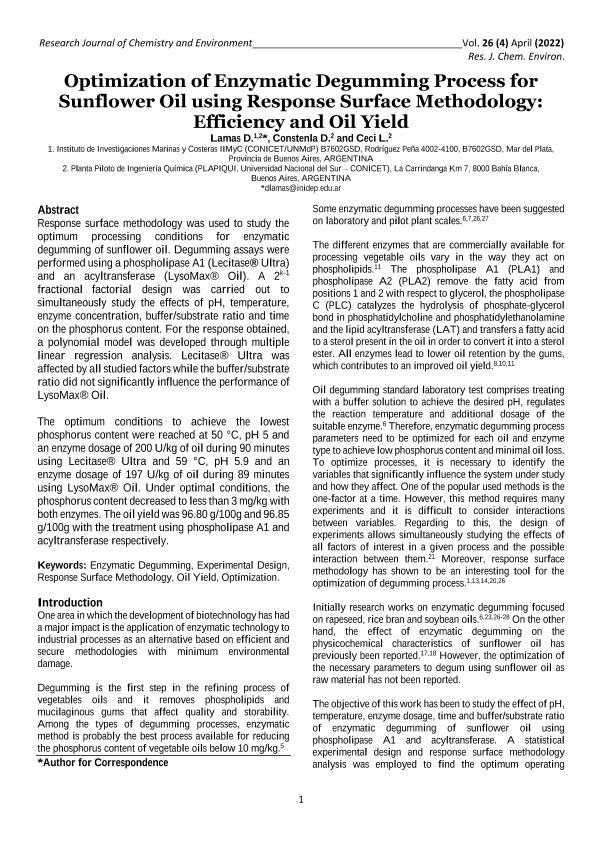Artículo
Optimization of Enzymatic Degumming Process for Sunflower Oil using Response Surface Methodology: Efficiency and Oil Yield
Fecha de publicación:
04/2022
Editorial:
Dr Jyoti Garg
Revista:
Research Journal Of Chemistry And Environment
ISSN:
0972-0626
Idioma:
Inglés
Tipo de recurso:
Artículo publicado
Clasificación temática:
Resumen
Response surface methodology was used to study the optimum processing conditions for enzymatic degumming of sunflower oil. Degumming assays were performed using a phospholipase A1 (Lecitase® Ultra) and an acyltransferase (LysoMax® Oil). A 2k-1 fractional factorial design was carried out to simultaneously study the effects of pH, temperature, enzyme concentration, buffer/substrate ratio and time on the phosphorus content. For the response obtained, a polynomial model was developed through multiple linear regression analysis. Lecitase® Ultra was affected by all studied factors while the buffer/substrate ratio did not significantly influence the performance of LysoMax® Oil. The optimum conditions to achieve the lowest phosphorus content were reached at 50 °C, pH 5 and an enzyme dosage of 200 U/kg of oil during 90 minutes using Lecitase® Ultra and 59 °C, pH 5.9 and an enzyme dosage of 197 U/kg of oil during 89 minutes using LysoMax® Oil. Under optimal conditions, the phosphorus content decreased to less than 3 mg/kg with both enzymes. The oil yield was 96.80 g/100g and 96.85 g/100g with the treatment using phospholipase A1 and acyltransferase respectively.
Archivos asociados
Licencia
Identificadores
Colecciones
Articulos(PLAPIQUI)
Articulos de PLANTA PILOTO DE INGENIERIA QUIMICA (I)
Articulos de PLANTA PILOTO DE INGENIERIA QUIMICA (I)
Citación
Lamas, Daniela Lorena; Constenla, Diana Teresita; Ceci, Liliana Noemí; Optimization of Enzymatic Degumming Process for Sunflower Oil using Response Surface Methodology: Efficiency and Oil Yield; Dr Jyoti Garg; Research Journal Of Chemistry And Environment; 26; 4; 4-2022; 1-10
Compartir
Altmétricas




